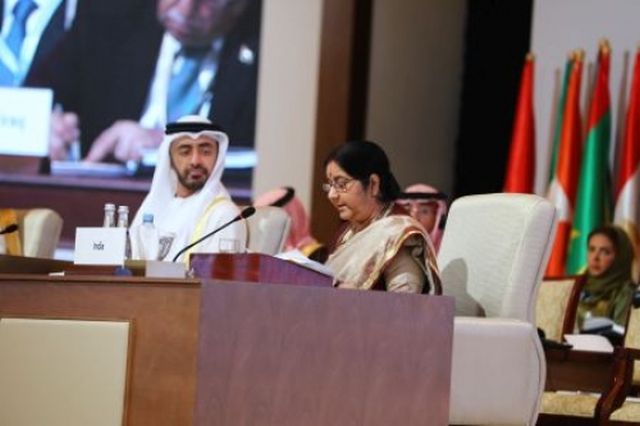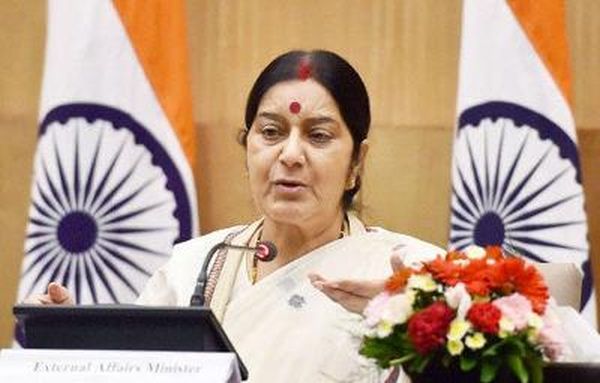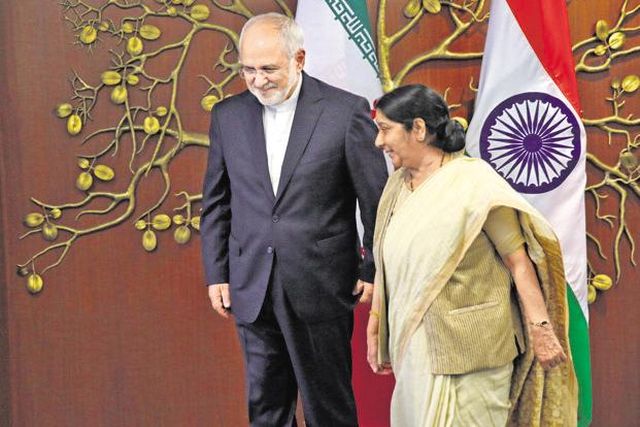
by admin | May 25, 2021 | Muslim World, Politics
 Abu Dhabi : External Affairs Minister Sushma Swaraj on Friday told the Organisation of Islamic Cooperation (OIC) conference that Muslims in India were a microcosm of its diversity and very few of them have fallen prey to the poisonous propaganda of radical and extremist ideologies.
Abu Dhabi : External Affairs Minister Sushma Swaraj on Friday told the Organisation of Islamic Cooperation (OIC) conference that Muslims in India were a microcosm of its diversity and very few of them have fallen prey to the poisonous propaganda of radical and extremist ideologies.
Addressing the plenary of the conference as a “Guest of Honour”, a first for India, she referred to India’ strong bonds with several member countries of the OIC including Bangladesh, Maldives and Afghanistan which are in its neighbourhood.
Swaraj expressed gratitude to Saudi Arabia, Bangladesh and others friends for their strong support for hearing India’s voice in this forum.
She also referred to Iran, saying the mutual partnership was vital for stability and prosperity in the region.
The minister said she was honoured to join her colleagues from nations that represent a great religion and ancient civilisations.
She said she was carrying greetings of Prime Minister Narendra Modi and 1.3 billion Indians, including more than 185 million Muslim brothers and sisters, and was representative of a land that has been for ages a fountain of knowledge, a beacon of peace, a source of faiths and traditions and home to religions from the world.
“Our Muslims brothers and sisters are a microcosm of the diversity of India. They speak Tamil and Telugu, Malayalam and Marathi, Bangla and Bhojpuri or any of the numerous languages of India.
“They have diverse culinary tastes, myriad choices of traditional attire, and they maintain strong cultural and linguistic heritage of the regions they loved and have lived for generations.”
She said Muslims in India practice their respective beliefs and live in harmony with each other and with their non-Muslim brethren.
“It is this appreciation of diversity and co-existence, that has ensured that very few Muslims in India have fallen prey to poisonous propaganda of radical and extremist ideologies.”
She said 2019 was a very special year as OIC is celebrating its Golden Jubilee, United Arab Emirates is celebrating Year of Tolerance and India is celebrating the 150th birth anniversary of Mahatma Gandhi, a global symbol of Truth and Non-violence.
“It is, therefore, a matter of pride for me,and for India, to be invited in this special year, to be your Guest of Honour, and to be extended a hand of friendship.”
She expressed her deep appreciation to UAE Foreign Minister Sheikh Abdullah Bin Zayed for his sagacious leadership and for his invitation.
Swaraj said that in the past four years, few relationships have seen as much engagement as India’s relationship with UAE and indeed, with the entire Gulf and West Asia Region. “It is a return of history.”
She said OIC has a key role in shaping the world with countries coming together on the foundation of a common faith as also a shared desire for a better future for their people.
She said India has forged deep bonds of friendship and close partnerships with many members of OIC.
“As India’s economy has grown and become more integrated with the world, these partnerships have become stronger. We have excellent political ties, marked by warmth, respect and goodwill. With many, we have expanding defence and security cooperation.”
“Our economic engagement is robust and growing rapidly. Our digital partnerships are shaping the course of our future. And, our ties have the warm glow of deepening human and cultural links.”
She said countries to India’s east including Brunei, Indonesia, and Malaysia were important pillars of India’s Act East Policy and ties with Afghanistan, Bangladesh and Maldives were forged in shared struggles, warmth and commitment to the security and prosperity of people and the region.
She said in Central Asia, India was rebuilding its relationship along new routes of possibilities.
“We do this, especially with and through Iran, a country, with which we not only share civilizational and cultural links, but a partnership, that is vital for stability and prosperity in our region.”
The minister said India’s solidarity with the aspirations of the Palestinian people has remained unwavering.
She referred to the close partnership with Egypt, India and Iraq standing together in our triumphs and trials and support for Jordan’s efforts “in strengthening the voices of moderation and building bridges of understanding between faiths”.
She said India has been working with countries like Tunisia, Morocco and Algeria with a shared desire for a more inclusive world.
“With Turkey, a nation, with which, we have many strands of connected history, we are imparting new momentum to our ties. Our many friends from Africa are here,” she said.
The minister said the Gulf region was India’s largest market, supplier of energy and source of remittances.
“More than 8 million Indians living in the region, are the 8 million vibrant threads of this partnership,” she said, adding that the relationship has vastly expanded in the past five years.
“It is an indispensable strategic and security partnership, and a natural economic partnership of immense value to our nations and for our shared region,” she said.
—IANS

by admin | May 25, 2021 | Business, Corporate, Corporate Governance, Medium Enterprise, SMEs
 Madrid : External Affairs Minister Sushma Swaraj and her Spanish counterpart Josep Borrell on Tuesday agreed, following a bilateral meeting in the Spanish capital, that both countries supported the promotion of multilateralism and a rules-based concept of free trade.
Madrid : External Affairs Minister Sushma Swaraj and her Spanish counterpart Josep Borrell on Tuesday agreed, following a bilateral meeting in the Spanish capital, that both countries supported the promotion of multilateralism and a rules-based concept of free trade.
The two leaders met at Madrid’s Viana Palace, the Spanish foreign ministry’s official headquarters, to discuss the most pressing issues on the international agenda, according to a ministry statement.
“The meeting has allowed us to confirm the growing degree of interlocution between Spain and Indian authorities and the current understanding between two partners that share values, democratic principles and vision regarding international affairs,” read the statement, Efe reported.
Both chief diplomats broached the budding potential of closer economic ties and industrial and technological cooperation between the Mediterranean and South Asian nations, especially in fields in which Spanish businesses are global leaders such as the civil use of nuclear energy, transport, the railway sector and renewable energy.
The ministry highlighted India’s increasing influence when it comes to the promotion of international stability and security.
Borrell and Swaraj congratulated each other for the imminent signing of a bilateral deal on water resources.
In addition, Borrell presented Swaraj with the prestigious Grand Cross of the Order of Civil Merit medal to honour India’s support for Spanish victims of the earthquake that devastated Nepal in April 2015.
The Spanish official expressed his condolences and solidarity in the aftermath of a brutal suicide bombing that has killed at least 40 paramilitary troopers in Indian-administered Kashmir and has sparked international condemnation.
India and Spain had already strengthened their relationship on December 1 when Spanish Prime Minister Pedro Sánchez and his Indian counterpart Narendra Modi, met on the sidelines of the G20 summit in Argentina.
In early January, Borrell visited India to continue the high-level talks between both countries and prepare a planned state visit by Sánchez scheduled for the third trimester of 2019, although the PM has since called snap elections for April, which has, for now, put those plans on hold.
—IANS

by admin | May 25, 2021 | Corporate, Corporate Governance, Economy, News
 Rabat : External Affairs Minister Sushma Swaraj and Moroccan Foreign Minister Nasser Bourita on Monday signed four agreements to cement bilateral cooperation.
Rabat : External Affairs Minister Sushma Swaraj and Moroccan Foreign Minister Nasser Bourita on Monday signed four agreements to cement bilateral cooperation.
The two foreign ministers inked four memorandums of understanding (MoUs) in the areas of security, housing, investments and youths, Xinhua news agency reported.
Speaking at a press briefing, Bourita said the signing of these agreements will strengthen the legal framework governing the relations between the two countries.
For her part, the Indian foreign minister stressed that India is committed to developing bilateral relations with Morocco.
Swaraj also met with several Moroccan officials, including the Prime Minister Saadeddine El Othmani.
—IANS

by admin | May 25, 2021 | News, Politics
 New Delhi : Terrorism, proliferation of weapons of mass destruction (WMDs) and climate change are the three critical challenges the world is facing today, External Affairs Minister Sushma Swaraj said on Wednesday.
New Delhi : Terrorism, proliferation of weapons of mass destruction (WMDs) and climate change are the three critical challenges the world is facing today, External Affairs Minister Sushma Swaraj said on Wednesday.
“There was a time when India would talk about terrorism, and it would be treated as a law and order issue on many global platforms,” Sushma Swaraj said while addressing 2019’s Raisina Dialogue, India’s flagship annual geopolitical and geostrategic conference, organised by the External Affairs Ministry in partnership with the Observer Research Foundation (ORF) think tank.
“Today, no country, big or small, is immune from this existential threat, particularly terrorism, actively supported and sponsored by states,” she said.
“In this digital age, the challenge is even greater, with a greater vulnerability to radicalisation.”
Sushma Swaraj recalled that in 1996 India proposed a draft Comprehensive Convention on International Terrorism (CCIT) but lamented it has remained just a draft till today “because we cannot agree on a common definition”.
“Ensuring zero-tolerance towards terrorism, and those who use it as an instrument of convenience, is the need of the hour,” she said.
The second threat, she said, is the threat of proliferation of WMDs.
Thirdly, she said, developing and under-developed nations are the worst victims of climate change, with neither the capacity nor the resources to meet the crisis.
“We have risen to meet the challenge. India, in partnership with France, launched the International Solar Alliance (ISA) with the participation of 120 countries,” Sushma Swaraj said.
In her address, she also outlined the five elements of India’s global engagement over the last four-and-a-half years.
Firstly, Sushma Swaraj said, India has rebuilt its bridges with its immediate and extended neighbours.
“In particular, Prime Minister’s strategic vision of SAGAR has spurred a qualitative transformation in India’s engagement with the Indian Ocean Region in recent years,” she said.
“Our revitalised Act East and Think West paradigms have further broadened the reach of our strategic and economic neighbourhood.”
Secondly, Sushma Swaraj said, New Delhi is shaping its relationships in a manner that synchronises with India’s economic priorities.
“With this ‘diplomacy for development’ approach, each global interaction is now focussed on building partnerships to promote our transformative flagship programmes such as Make in India, Smart Cities, Digital India, AMRUT and Namami Gange,” she stated.
“Third, we are focussed on making India a human resource power to be reckoned with by connecting our talented youth to global opportunities.
“This is being achieved through Skill India partnerships with several countries, as well as under the aegis of the GIAN programme and various private sector partnerships under Digital India.”
Fourthly, the External Affairs Minister said, India is building sustainable development partnerships stretching from the Indian Ocean and Pacific Islands to the Caribbean, and from the continent of Africa to the Americas.
“These initiatives have expanded; both in geographical reach and sectoral coverage, and now include Lines of Credit and grants, technical consultancy, educational scholarships and a range of capacity-building programmes,” she said.
Finally, Sushma Swaraj said, India is leading the way in reconfiguring and reinvigorating global institutions and organisations.
“Whether it is by founding the International Solar Alliance, which will benefit our energy security and also combat climate change; or our active role in humanitarian and disaster relief operations in our neighbourhood; or our membership of key institutions of global governance – India is a proactive and constructive contributor to promoting and upholding global peace and security,” she said.
This year’s Raisina Dialogue, which is in its fourth edition, is being attended by over 600 delegates from 92 countries, including influential political leaders, strategic thinkers, policy practitioners, technology innovators, business representatives and academics.
—IANS

by admin | May 25, 2021 | Corporate, Corporate Governance, News, Politics
 By Arul Louis,
By Arul Louis,
United Nations : External Affairs Minister Sushma Swaraj and Iranian Foreign Minister Mohammad Javad Zarif discussed US sanctions against Tehran amidst American President Donald Trump issuing dire warnings at the Security Council against violating the embargo.
India and Iran “shared each others’ position about where we stand at this point of time” on the sanctions, External Affairs Ministry spokesman Raveesh Kumar told reporters after the Ministers’ meeting on the sidelines of the UN General Assembly session here on Wednesday.
At the Security Counci, Trump said that the sanctions against Iran will come into full force in November and warned “any individual who fail to comply with these sanctions will face full consequences”.
Kumar said that India was engaged with all the stakeholders dealing with the sanctions and, therefore, it discussed it with Iran also.
Zarif told Sushma Swaraj about Iran’s interaction with the European Union (EU) and other countries over the sanctions, according to Kumar.
The spokesman said that Iran and India had “civilisational ties” going back in time and the discussions went beyond the sanctions issue.
Trump pulled Washington out of the nuclear deal known as the Joint Comprehensive Plan of Action (JCPOA) that Iran signed with the five permanent members of the UN Security Council, Germany and the EU, to end sanctions in return for Teheran stopping nuclear weapons development.
The EU and most countries back the nuclear deal and oppose US sanctions and Trump found himself isolated at the Security Council.
Washington’s allies, British Prime Minister Theresa May and French President Emmanuel Macron, openly opposed Trump at the Security Council meeting and expressed their support for the agreement with Iran.
Kumar declined to comment on foreign media reports that India was going to stop importing Iranian oil.
(Arul Louis can be reached at arul.l@ians.in and followed on Twitter at @arulouis)
—IANS

 Abu Dhabi : External Affairs Minister Sushma Swaraj on Friday told the Organisation of Islamic Cooperation (OIC) conference that Muslims in India were a microcosm of its diversity and very few of them have fallen prey to the poisonous propaganda of radical and extremist ideologies.
Abu Dhabi : External Affairs Minister Sushma Swaraj on Friday told the Organisation of Islamic Cooperation (OIC) conference that Muslims in India were a microcosm of its diversity and very few of them have fallen prey to the poisonous propaganda of radical and extremist ideologies.



